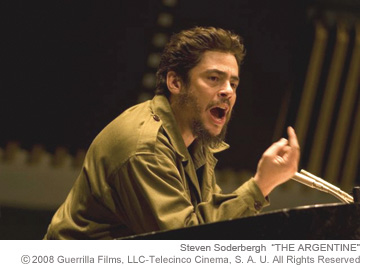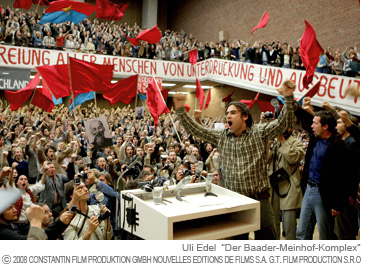|
| 1 | 2 | 3 | 4 | |
So what were the obstacles you had to conquer?
The thing is, the film has been very strongly supported by Canal+, which is like a French Pay TV and film producer, so they support my options, this meaning, to tell the story on this broad canvas, because it grew from this small project into a three part monster (he laughs). And they kind of agreed with me that we needed this kind of scale to tell the story. They agreed on the different languages, they agreed on using someone who is, well, famous but not a big star to play the role. I wanted to use Edgar Ramirez who is---heís been in a few movies especially in Hollywood, but heís not a household name. So that was also a big matter, because I think he has in him, something close to the character of Carlos and I think he is one great asset to the film. So itís all those elements I had to impose one by one, and I was lucky to have the support of the financiers. So it was not difficult as it could have been. But the major difficulty from the start was to recreate so many countries, in order to recreate the story of Carlos. It moves from one country to the other. During a specific period, heís in London, heís in Paris, and heís in the training camps in Lebanon. Heís in the training camps in Yemen. Then heís dealing with Colonel (Muíammar Mohammad al Qadhafi in Lybia. So thereís a lot of hopping from one ďambientĒ to the other. It involves recreating all the ambience, such as cars, uniforms, and to be able to shoot in locations that are not that commonly used in European cinema. I could go on and on. There were many many major obstacles. But the basics were, once we kind of agreed on a reasonable budget that kind of allowed us to go into the area to make the film, well, everything took shape.
Are you shooting on DV or on film?
No, weíre shooting in 35. Weíre shooting in Super 35, meaning cinemascope format.
What attracted you to Carlos in the first place?
Initially, it was a TV producer, Daniel Leconte, who came to me. I had known him for a while but had never worked together. One day, he sent me four pages. ďIím sending you a synopsis. Are you interested?Ē It was not a story of Carlos, but it was a story loosely based on him. And it was basically material for a TV movie. But then, he sent, with the four pages, a file of journalistic research that basically summed up what is known as the history of Carlos. I read the synopsis, which was not anything of my interest really, but then, looking at the research on the story of Carlos, I could not stop reading. It was kind of fascinating. So I called him back, saying, the story, the material you sent is not for me, but then, if youíre interested in making a film about the story of Carlos, Iím extremely willing to look into it. I think it is, in terms of the story of European leftism, and how, on some occasions, it evolved into violent action. I think itís a fascinating story and it has never been told.
And it has never been told from that angle. It has more or less been approached closely here and there, but ultimately this is like the core of it.
I was also interested in dealing with a character that has become a modern myth. It is not the kind of character Iíve been using in my (previous) films. Iíve never really dealt with modern history in my films. And here was an opportunity to deal with something that is bigger than life, to deal with modern History, with a capitol H, and I think there was a lot in it for me in terms of stimulation, and I kind of knew it would allow me to ground it on the cinema that I have never really explored. So you know, I think I had many reasons. I didnít know how long it would take. I didnít know how far it would take me in terms of monopolizing on the movement. I was very excited by the notion that it already had.
And it has never been told from that angle. It has more or less been approached closely here and there, but ultimately this is like the core of it.
I was also interested in dealing with a character that has become a modern myth. It is not the kind of character Iíve been using in my (previous) films. Iíve never really dealt with modern history in my films. And here was an opportunity to deal with something that is bigger than life, to deal with modern History, with a capitol H, and I think there was a lot in it for me in terms of stimulation, and I kind of knew it would allow me to ground it on the cinema that I have never really explored. So you know, I think I had many reasons. I didnít know how long it would take. I didnít know how far it would take me in terms of monopolizing on the movement. I was very excited by the notion that it already had.
 I assume it would be different from what Soderberg did with Che Guevara.
I assume it would be different from what Soderberg did with Che Guevara.It is very different from what Soderberg did with ďCheĒ Guevara because---but I must say, I liked (the film) ďCheĒ very much, but it was a completely different approach also because itís a very different character. But then, seeing ďCheĒ gave me the confidence also that eventually one can do a coherent job of historical recreation of that period in film, and you can also do it on this kind of big canvas, meaning that you could take time to tell the story. I saw ďCheĒ when it was shown at the Cannes Film Festival. I saw the two films in a row, and I liked them very much, I must say. I never got bored. So I thought maybe I could tell the story of Carlos in 4 and a half hours, and manage to make it not too boring for the audience. It just worked as a template for my own film.
Did you have a model in mind, for this type of storytelling?
No. Mainly because itís never been done really, strictly in French cinema. The thing is, that Carlos was an international terrorist, heís connected with the German leftists, heís connected with the Japanese militants, heís, of course, connected with the PFLP of the Palestinians, heís connected with Beirut, he worked with the Syrians, he worked for the Libyans, he had connections within the Eastern bloc at the time of the Cold War. This meaning that the way his story connects all those different worlds, and it is kind of unique in a sense that even in the spy, thrillers from the 60ís that use this kind of cold war realism, they didnít deal with that kind of geography. The originality and the strength of the story of Carlos is that his geography is extremely original, and extremely important historically. And I think the one thing a movie like that can bring is the understanding of the international connection at the time, and I think it is something that has never been explored.
Have you seen the ďthe Baader Meinhof ComplexĒ?
Yes, Iíve seen it. And I think itís an interesting film, but it comes from a completely different place, because it is extremely local in terms of German history. And I think the shortcoming of the film---which again I like and think there are solid elements here and there---but its shortcoming is that it doesnít really deal with the politics of Baader-Meinhof. And it doesnít exactly explicit the international connection of where the money came, or eventually, where the orders came. It doesnít deal with the East German connection. It doesnít exactly deal with the Middle Eastern connection. I mean, we see them in training camp, but we donít exactly understand the whereabouts, the inner logic of their politics. So, itís a strong film on many levels, but I think it is on a completely different note than how we would do it. Also, I think I saw the Japanese film Wakamatsu did on the Japanese Red Army, which is also on a different note. Looking at it, it is exciting and interesting, and had me focus on some of the elements of the film, but again, itís a very different film.
 And incidentally, Jim OíRourke did the music for that film.
And incidentally, Jim OíRourke did the music for that film.Yes, I know. (he laughs)
The way you have dealt with music and images, in your previous films, does that come into this film?
At this time itís too early. I have no idea how Iím going to use music on this film.
Is it a more conventional way of storytelling?
Yes. I would say so. I donít think there would be much music in this film. There will be music when it plays a part in the story. The way I see it now, I think there will be as little music as possible in the film.
It was interesting how you talked about Baader-Meinhof, that you didnít see the money flow, of how they got the finance. In your film, you will obviously dealing with that, his global connection?
Oh yes! Because Carlos is a member of the PFLP, so he reports directly to Wadi Hadaad. At the same time, he had not completely cut his connection with the POL. So he had even formed underground ties with Arafatís POL. And he was also a notorious KGB agent. Anyway, Carlos worked for Wadi Hadaad, and he was dependent, at least in the first part of his career, on his financing. And the financing of Wadi Haddad came from Bagdad, from Tripoli, and had very strong support from the Eastern bloc. After Wadi Haddadís death, Carlos was hired by the Syrians, and technically became a Syrian agent. He had clear support from the Stasi, which kind of authorized Carlosís weapon trade. He made major money being funded by the Syrians, being funded by the Libyans also. But the Syrians and Libyans gave him weapons to sell. He was ultimately making money by selling those weapons to various underground groups in Europe, like the Basque ETA, and the IRA in Ireland.
By the way, do you have a Jewish background in your family?
My father was Jewish. My mother is protestant Hungarian. But yes, my father was Jewish.
So you are not Jewish?
No, I am not really Jewish.
I was just interested in the fact that you are shooting in Lebanon.
Well, no. It is obviously an issue, but it has never come up.
You mean, in the context of the film?
Yes.
| 1 | 2 | 3 | 4 | |
